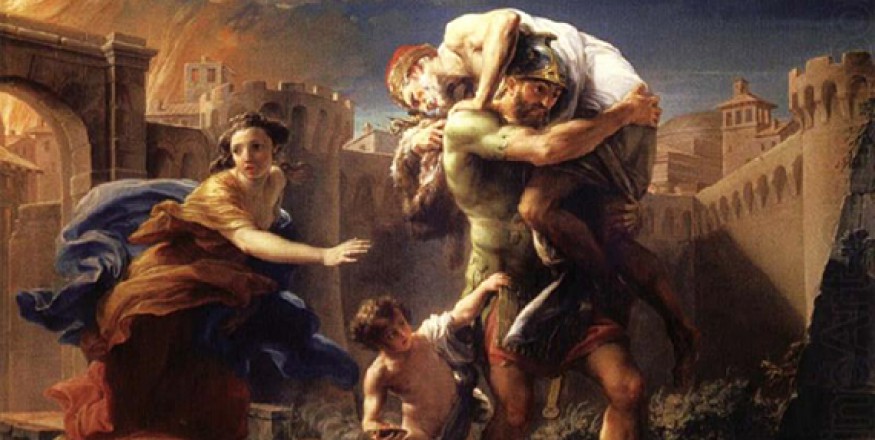The Aeneid is an epic poem written in 12 books and is modeled in part on the great Greek epic poems, on Homer's Iliadand Odyssey, and on Apollonius' Argonautica. The Iliad describes the exploits of Achilles and other Greek heroes in the Trojan War (the same war which forced Aeneas to leave Troy and is described in Book II of the Aeneid) whilst the Odyssey describes how Ulysses (or Odysseus in Greek) wandered for many years, trying to return home after the Trojan War.
The first six books of the Aeneid parallel the Odyssey because they describe Aeneas' search for a home. Aeneas even stops in many of the same places that Odysseus did. There is an important difference, however, for whilst Odysseus was trying to return to his original home, Aeneas must find a new place in which to settle and make his home.
The second six books parallel the Iliad, for they describe the war in Italy just as the Iliad describes the Trojan War. Again, there are many parallels. For example, the Trojans are besieged inside their fort in Italy just as they were trapped inside Troy. But again there is an important difference, since the Iliad describes how the Trojans lost the war and Troy fell but in theAeneid the Trojans win the war in Italy and get the chance to build a new city.
Virgil imitates many scenes from both the Iliad and the Odyssey in his epic, but he always changes them in significant ways so that they illustrate his own Roman themes. One of the most important differences between Homer's epics and the Aeneid is that it can be read as a patriotic poem whilst the Iliad and the Odyssey are poems about individuals and their adventures. Homer emphasizes heroes, not countries. But one of Virgil's main points is to show how Rome became the city it is, and to outline the virtues that make a good Roman citizen or leader, and in this way Virgil is far more moralistic in his approach than Homer. One example of this difference in attitude can be seen in the epithets applied by the poets to their respective heroes, for whilst Odysseus is 'poikilios "wily", Aeneas is frequently described as pius, "pious" or "righteous", which conveys a strong moral tone.
The Aeneid can be viewed as being divided into three parts. The first four books take place with Dido in Carthage, including a flashback to the fall of Troy. The second four books (V-VIII) describe the Trojans' arrival in Italy and Aeneas' trip to the underworld where he sees the future of Rome. The last four books (IX-XII) describe the war in Italy and Aeneas' triumph over Turnus.
The books of the Aeneid can also be considered in pairs. The odd-numbered books tend to be less dramatic (for example, Book III in which the Trojans' wanderings are described or Book V which contains the funeral games held for Anchises). The even-numbered books reach greater emotional peaks, for example, the death of Dido in Book IV, and Aeneas' vision of the future in Book VI.
ns18.218.103.193da2




















